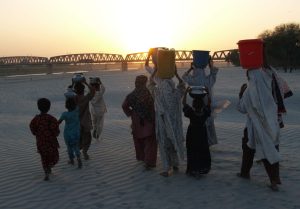Imagine yourself walking along the banks of the Jhelum River. You begin your trek at Verinag, walking along the arcade and garden built by Emperor Jahangir in 1620. You admire the city of Srinagar (the “Indian” capital of Jammu and Kashmir) as you continue your walk. This river, once crossed by Alexander the Great and one of the many rivers mentioned in the Rigveda, is now one of the main sources for irrigation for the many apple orchards of the region.
Agriculture is, and has been, the backbone of the region’s economy, and today that economy is threatened. Despite the Jhelum River being under one of the most touted international water treaties of the 20th century, the Indus Waters Treaty, mining and other damaging projects have made it more and more difficult for the region’s farmers to get the water they need.
The Jhelum is just one of six tributaries that make up the Indus basin. Since 1960, the Indus Waters Treaty (IWT) has attempted to divide the water rights for the basin equitably between India and Pakistan. However, the treaty is currently hanging on by a thread, and the roots of this precarity can be traced back to the IWT’s establishment. Today, because of growth in population and water demands, the difficulties of climate change, and the mismanagement of the tributaries by both states, it is critical to renegotiate the treaty.
The IWT has managed to survive tense and at times violent relations between India and Pakistan. However, armed conflict over territory turns out to be less difficult to overcome than the realities of climate change, technological development, and population growth. For years, the IWT was praised for its “far-sightedness” by commentators and experts like Surya P. Subedi in 1999, but in recent years it has become clear that the literal “divorce” of the Indus Basin was a mistake. The IWT was a reasonable short-term solution in the 1950s to the growing territorial and water rights tensions between India and Pakistan. However, today, a critical reevaluation of the assumptions and method of the IWT is urgently needed.
A renegotiation of the waters in the Indus Basin will require not only an updated understanding of the current physical situation, but more importantly an attempt to reverse the “split” of the Indus Basin and develop a way to actually share the waters. Currently, the Indus waters are not being utilized efficiently or fairly, in Pakistan, India, or Jammu and Kashmir (not to mention the growing water needs of Afghanistan and China).
































